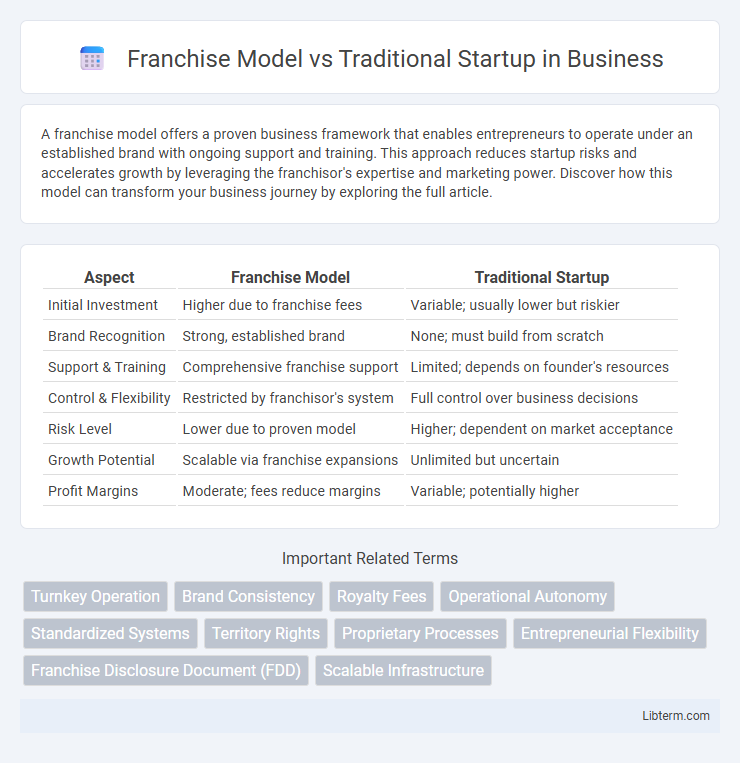A franchise model offers a proven business framework that enables entrepreneurs to operate under an established brand with ongoing support and training. This approach reduces startup risks and accelerates growth by leveraging the franchisor's expertise and marketing power. Discover how this model can transform your business journey by exploring the full article.
Table of Comparison
| Aspect | Franchise Model | Traditional Startup |
|---|---|---|
| Initial Investment | Higher due to franchise fees | Variable; usually lower but riskier |
| Brand Recognition | Strong, established brand | None; must build from scratch |
| Support & Training | Comprehensive franchise support | Limited; depends on founder's resources |
| Control & Flexibility | Restricted by franchisor's system | Full control over business decisions |
| Risk Level | Lower due to proven model | Higher; dependent on market acceptance |
| Growth Potential | Scalable via franchise expansions | Unlimited but uncertain |
| Profit Margins | Moderate; fees reduce margins | Variable; potentially higher |
Introduction: Understanding Franchise Model vs Traditional Startup
The franchise model enables entrepreneurs to operate businesses under established brand names with proven systems, reducing startup risks and accelerating market entry. Traditional startups require founders to build brand identity, develop products or services, and establish customer bases from scratch, often facing higher uncertainty and longer timelines. Understanding these fundamental differences helps investors and aspiring business owners select the most suitable growth strategy.
Key Differences Between Franchise and Traditional Startup
Franchise models provide a proven business system, established brand recognition, and ongoing support, reducing risk compared to traditional startups, which require building a brand and operational model from scratch. Franchisees benefit from franchisor-provided training, marketing, and operational guidelines, while traditional startups must independently develop these elements. Financially, franchises often involve initial franchise fees and ongoing royalties, whereas traditional startups have more variable costs based on founder decisions.
Initial Investment and Financial Commitment
Franchise models typically require a higher initial investment due to franchise fees, setup costs, and mandatory royalty payments, which ensure brand consistency and support. Traditional startups often have variable initial costs that can be lower but come with greater financial risk and uncertainty since all expenses and brand development rely on the founder. The financial commitment in a franchise includes ongoing fees and marketing contributions, whereas traditional startups bear full responsibility for operational costs and capital investment without built-in corporate support.
Brand Recognition and Marketing Support
Franchise models offer established brand recognition, allowing entrepreneurs to leverage a proven market presence and customer loyalty from the outset. Marketing support in franchises includes centralized campaigns, promotional materials, and strategic guidance, reducing the burden on individual franchisees. In contrast, traditional startups must invest significant resources in building brand identity and developing marketing strategies independently, often facing higher initial challenges in gaining consumer trust.
Operational Control and Flexibility
The franchise model offers structured operational control through standardized processes and brand guidelines, ensuring consistency across locations, while limiting flexibility in decision-making for individual franchisees. Traditional startups provide entrepreneurs with full operational control, allowing greater adaptability and innovation in business practices but require more effort to establish brand identity and operational systems. Operational flexibility in startups can lead to faster pivoting in response to market changes, whereas franchisees benefit from proven protocols that minimize risk but restrict customization.
Training, Support, and Resources
Franchise models provide comprehensive training programs, ongoing support, and access to established resources, enabling faster market entry and operational efficiency compared to traditional startups. Traditional startups often rely on self-developed training and limited support structures, leading to potentially higher risks and longer learning curves. Franchisees benefit from proven business systems and brand recognition, while traditional entrepreneurs must create these elements independently.
Risk Factors and Success Rates
Franchise models typically present lower risk factors compared to traditional startups due to established brand recognition, proven business systems, and ongoing franchisor support. Success rates for franchises average around 80-90% within the first five years, while traditional startups often experience failure rates nearing 90% in the same period. Key risk factors for traditional startups include market uncertainty, lack of operational experience, and limited access to capital, whereas franchises face risks related to franchise fees, compliance requirements, and limited creative control.
Growth Potential and Expansion Opportunities
Franchise models offer accelerated growth potential through established brand recognition, proven operational systems, and centralized support, enabling quicker market penetration and reduced risk. Traditional startups require more time and resources to establish brand identity and operational efficiency, but they provide greater flexibility in innovation and market adaptation. Expansion opportunities in franchising are typically streamlined via replicable frameworks and franchisor guidance, whereas startups must independently develop scalable models and manage growth complexities.
Legal and Regulatory Considerations
Franchise models require adherence to established franchise disclosure laws, including providing a Franchise Disclosure Document (FDD) to prospective franchisees, which outlines legal obligations and financial risks. Traditional startups face a broader range of regulatory compliance based on their industry but lack the uniform franchise-specific guidelines, leading to variable legal frameworks. Franchise agreements include strict controls on branding and operational methods, while startups maintain flexibility but bear full responsibility for compliance with local business licenses, permits, and industry regulations.
Choosing the Right Path: Franchise or Traditional Startup
Choosing the right path between a franchise model and a traditional startup depends on factors like risk tolerance, initial investment, and control preferences. Franchises offer a proven business model with brand recognition and support systems, reducing startup risks and accelerating market entry. Traditional startups provide full creative freedom and potential for higher returns but require more effort in brand building and market validation.
Franchise Model Infographic

 libterm.com
libterm.com